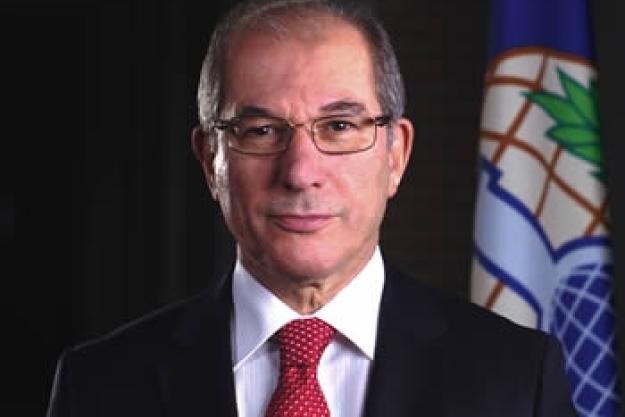
Ahmet Üzümcü, Director-General OPCW
Statement by Ahmet Üzümcü, Director-General OPCW
Just under 9 months ago in October, I addressed you members of the press – in this same place, here in The Hague – to announce the deployment of the first OPCW inspectors to Syria to begin an historic and unprecedented mission. The mission was to destroy the chemical weapons programme of the Syrian Arab Republic.
A major landmark in this mission has been reached today. The last of the remaining chemicals identified for removal from Syria were loaded this afternoon aboard the Danish ship Ark Futura. The ship made its last call at the port of Latakia in what has been a long and patient campaign in support of this international endeavour.
Removing the stockpile of precursor and other chemicals has been a fundamental condition in the programme to eliminate Syria’s chemical weapons programme.
The next stage in this mission is the completion of the maritime operations to deliver the chemicals for destruction at the assigned facility on board the U.S. vessel Cape Ray and at commercial facilities in Finland, Germany, the United Kingdom and the United States of America.
The mission to eliminate Syria’s chemical weapons programme has been a major undertaking marked by an extraordinary international cooperation.
Never before has an entire arsenal of a category of weapons of mass destruction been removed from a country experiencing a state of internal armed conflict. And this has been accomplished within very demanding and tight timeframes.
The mission has seen over 30 countries and European Union committing significant financial and in-kind assistance. This cooperation covered key logistical and transportation requirements, including a complex maritime operation. The collaboration with Member States relating to destruction activities and the provision of equipment and industrial facilities for this purpose is unprecedented in the history of disarmament. I wish to express our profound gratitude to all these States Parties.
This collective endeavour was born here, in The Hague, of a treaty that has more than demonstrated its resilience and responsiveness. Following the Framework Agreement concluded between the Russian Federation and the United States of America, the OPCW was called upon to devise and implement an elaborate programme. Various milestones and interlocking steps for a sequenced elimination and verification were established.
The Executive Council of the OPCW supported by the Secretariat remained fully engaged in its oversight of the implementation of the programme. Some eighteen meetings of the Executive Council have so far taken place at OPCW Headquarters, with numerous rounds of informal meetings and technical consultations in the background.
There were expected and unexpected challenges along the way. But the OPCW and member states have been able to overcome them – both through careful diplomacy and innovative technical solutions.
Although there were delays in the process, the cooperation of the Syrian Arab Republic has been commensurate with the requirements of the decisions.
And, crucially, we were able to count on the invaluable cooperation of the United Nations to provide logistical and security support for our verification effort in Syria through the OPCW-UN Joint Mission.
I take this opportunity to commend the Special Coordinator of the OPCW-UN Joint Mission, Ms Sigrid Kaag, and all those OPCW and UN staff who have participated in this mission. Their dedication and professionalism, in challenging circumstances, have been a key factor in the attainment of the critical progress that we recognise today.
While a major chapter in our endeavours closes today, OPCW’s work in Syria will continue. We hope to conclude soon the clarification of certain aspects of the Syrian declaration and commence the destruction of certain structures that were used as chemical weapons production facilities. Syria’s cooperation with the work of the OPCW Fact Finding Mission will also remain important. The OPCW will continue to engage with Syria to ensure that it is able to fulfil all its obligations under the CWC and the relevant decisions of the Executive Council and UN Security Council resolution 2118 (2013).
